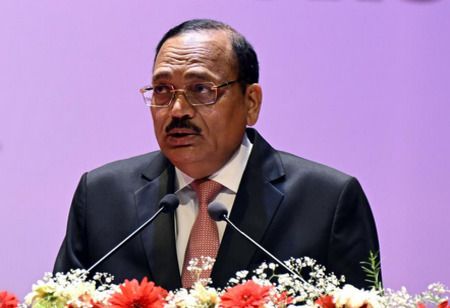
Justice Surya Kant Nominated as Next Chief Justice of India


Chief Justice of India BR Gavai put forward Justice Surya Kant, who holds the position of the most senior judge following him, as his recommended replacement to the central government. With CJI Gavai's tenure concluding on November 23, Justice Surya Kant is anticipated to take on the role of India's 53rd Chief Justice on November 24, pending approval from the Law Ministry.
Should he be selected, Justice Kant would make history as the first individual from Haryana to hold the nation's highest judicial position. Justice Surya Kant was born on February 10, 1962, in a modest village within Hisar district. His journey from receiving his early education in a rural setting to reaching the Supreme Court represents a remarkable climb through Haryana's judicial system.
Also Read: Shashikanth Someshwar to Lead Weber Shandwick India as CEO
Coming from a middle-class background with a father who worked as an educator, Justice Kant pursued his initial studies locally before earning his law qualification from Maharshi Dayanand University in 1984. He started his legal career at Hisar's district court before relocating to Chandigarh to work at the Punjab and Haryana High Court.
Justice Kant achieved a significant early career achievement by becoming Haryana's youngest Advocate General at 38 years old, marking the beginning of his swift professional advancement.
In 2004, he was appointed as a judge to the Punjab and Haryana High Court, where he remained for over 14 years. During his High Court service, he pursued further education and earned his Master's in Law from Kurukshetra University in 2011, achieving first-class honors in his graduate studies.
Also Read: Union Minister Urges NIELIT on Industry-wide Partnership
On October 5, 2018, Justice Kant received his appointment as Chief Justice of the Himachal Pradesh High Court before his promotion to the Supreme Court on May 24, 2019. Throughout his time on the nation's highest court, participating in over 300 bench proceedings since his appointment, he has delivered numerous prominent and constitutionally important rulings spanning criminal, constitutional, and administrative legal matters. His projected term as Chief Justice is set to continue until his retirement on February 9, 2027, providing him with approximately 14 to 15 months in the position.
Justice Kant's judicial approach has consistently been characterized as thoughtful and even-handed, distinguished by his emphasis on holding institutions responsible (including investigative bodies, government agencies, and legal entities) while prioritizing individual rights and procedural protections. He has demonstrated clear commitment to addressing both significant constitutional matters and workable solutions, spanning areas from election openness and women's rights to labor law acknowledgment and privacy protections.
Justice Kant's rise to the highest judicial position represents a historic milestone for Haryana, as no judge from this state has ever served as Chief Justice of India before. His background, which traces back to rural Hisar through his academic years at MDU and Kurukshetra University, legal practice at Punjab and Haryana High Court, tenure as Haryana's Advocate General, and judicial service, represents locally a symbol of career advancement achieved through excellence.
Also Read: FM Links Pension Reforms to Atmanirbhar Bharat Vision
When Justice Kant assumes his duties, he will face the Supreme Court's administrative challenges, notably tackling a pending caseload of approximately 90,000 matters. Legal professionals, parties in litigation, and state administrations will closely observe how his management approach will reconcile case resolution, judicial system improvements, and the court's wider constitutional responsibilities.
The official designation needs the government's approval following CJI Gavai's endorsement. Upon confirmation, Justice Surya Kant's appointment will fulfill the traditional progression based on seniority while installing a legal scholar with strong Haryana connections and an established history of rulings spanning diverse national matters at the head of India's court system.